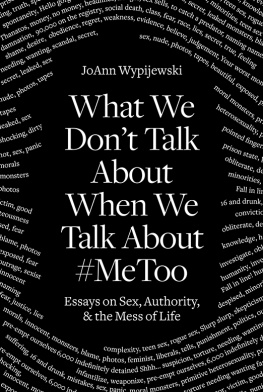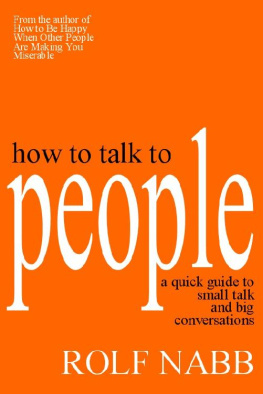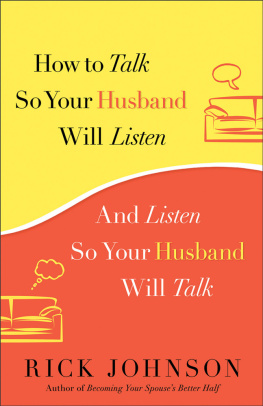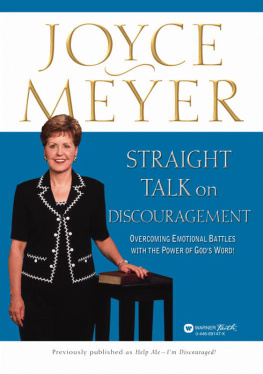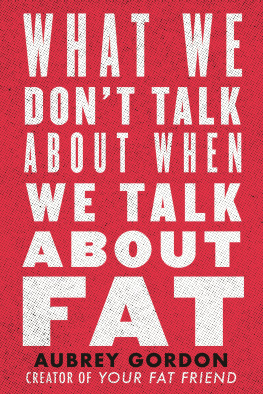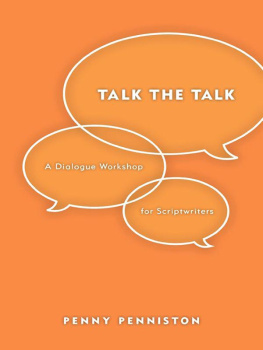Contents

Uncomfortable, powerful, moving; few writers can give us the nitty-gritty of sex and its messiness within the grand sweep of history, and get both the big picture and the details exactly right.
Jeffrey Escoffier, author of American Homo
What We Dont Talk About speaks for many women who resist (sometimes quietly) the peer pressure that has no name, and for women dismayed by the politics of belief infecting our secular conversations about sex. Injustice has become a sustainable resource, and JoAnn Wypijewski eloquently documents its variations. Her reporting is solid and energetic. Wypijewski knows how to unpack a monster.
Tracy Quan, author of Diary of a Manhattan Call Girl
No other writer is telling these stories; maybe no other writer could with such generosity of spirit. Mercy is the scandal now, Wypijewski writes of the ways in which too many have come to prefer the counting of sins to the dream of liberation, but this is no book of lamentations. Through a series of moments intimately observed, she summons us again to consider the possibilities for pleasure, eros as ally, in any struggle to get free. Hers is a prophetic voice.
Jeff Sharlet, author of The Family and This Brilliant Darkness
This book lays bare the twisted logics we employ to convince ourselves that there are easy distinctions between love, brutality, sex, and capitalism. Wypijewskis work is exemplary journalism, taking us to the hearts of neighborhoods and cities and towns from which sex panics emanate, and eliciting interviews and conversations with those affected which reveal how futile it is to search for perfect victims and villains. But her writing is also brilliant analysis, an unrelenting excavation not just of what happened and to whom, but what it means to all of us watching from the sidelines. She unflinchingly reminds us that the larger problem is not that we see and experience bad forms of sex, but that we dont look at sex enough to understand our complicated and uneasy relationships to it. Like few other writers, Wypijewski provides an archaeology of sex which is in turn an archaeology of power.
Yasmin Nair, writer, activist, academic
JoAnn Wypijewski has written steadily and courageously on topics that paralyze other reporters into silence or lukewarm compromise. She knows that our horror of crime springs from the same root as our need for scapegoats. Her essays are always perceptive, and always worth reading.
David Bromwich, author of American Breakdown: The Trump Years and How They Befell Us
JoAnn Wypijewski stimulates us to think freshly about sex and sexual politics, and she is not afraid to infuriate both those who consider themselves sexual progressives and traditional conservatives. Lets call a town meeting of the whole country to grapple with the insights, the fury, and most of all the wisdom in this essential book.
Peter Davis, Academy Award winning filmmaker of Hearts and Minds, author of Girl of My Dreams
What We Dont Talk About
When We Talk About #MeToo
Essays on Sex, Authority
& the Mess of Life
JoAnn Wypijewski

First published by Verso 2020
JoAnn Wypijewski 2020
All rights reserved
The moral rights of the author have been asserted
1 3 5 7 9 10 8 6 4 2
Verso
UK: 6 Meard Street, London W1F 0EG
US: 20 Jay Street, Suite 1010, Brooklyn, NY 11201
versobooks.com
Verso is the imprint of New Left Books
ISBN-13: 978-1-78873-805-7
ISBN-13: 978-1-78873-806-4 (UK EBK)
ISBN-13: 978-1-78873-807-1 (US EBK)
British Library Cataloguing in Publication Data
A catalogue record for this book is available from the British Library
Library of Congress Control Number
2020932062
Typeset in Sabon by MJ & N Gavan, Truro, Cornwall
Printed and bound by CPI Group (UK) Ltd, Croydon CR0 4YY
From 2015 through 2017, I had the privilege of holding the Belle Zeller Visiting Professorship in political science at Brooklyn College, an honorary post, now, sadly, eliminated under austerity. I taught various classes involving politics and language, and one class called Media Panic, Sex and the Politics of Fear.
This book is dedicated to my students, about two hundred young women and men across four semesters, who had complicated lives and abundant ideas, who didnt censor themselves or one another, who taught me a lot and who, I hope, are out in the world, smart, skeptical and brave.
Contents
John Scagliotti introduced me to Margaret Cerullo, who has been, like John, a beloved friend and marvelous intellectual spark. Margaret introduced me to Pamela Bridgewater, who, like Margaret and John, complicated my thinking in almost every conversation until she died and, with her husband, Kweku Toure, magnified the meaning of family. The Nation, where I worked until 2000, introduced me to Alexander Cockburn, who introduced me to Laura Flanders, who introduced me to Amber Hollibaugh, a radiant earth angel of experience and knowledge, who helped me begin to make sense of ideas about class and sex and risk for which I didnt have the words before going to Jamestown, New York, for the first essay in this collection. Jamestown introduced me to another Amber, another brave, searching soul, whose months of conversation from a jailhouse put spirit and bone to the contradictions of need and human error that tend to be lost in the blaring talk-talk about sex and danger.
Alexander, Alex now dead and gone, introduced me to many thingsincluding the reporting of Debbie Nathan (and later to the incomparable Debbie)but most profoundly to the riddles of love. The Nation re-introduced me to Lewis Lapham, the first editor who embraced me as a writer, offered money for a story and space to tell it properly. The Secret Sharer, A Boys Life and Judgement Days were first published in Harpers. Lewis commissioned Sin, a Story of Life at the height of the priest scandal in Boston in 2002, but hated it; Virginia Heffernan, my editor there at the time, loved it, which had not seemed to be a disagreeably contentious overall response, but Lewis was the boss, and the piece went homeless. I include it here, rather than an adaptation that appeared years later in Legal Affairs (thank you, Emily Bazelon and the fact-checkers there), because Lewiss frustrated but astute observation in the momentI think everyone is lyingcaptures what I consider its strength. Many truths are embedded in scandal, but they are not to be found in the simple retelling or debunking of stories. There is pain here but there are no heroes, least of all among media SWAT teams whose aim, conscious or not, is not to encourage anyones independence but simply to replace one deference with another, one unquestioned authority with another. Faith-Based Justice, commissioned by Barbara Epstein for New York Review of Books, died with her, alas, and is included as an illustration of the travesty that occurs when the logic of scandal becomes the logic of a law court.
I met Katrina vanden Heuvel, publisher and editorial director of The Nation, when we were practically girls, and I appreciate having grown up with her there. The title essay was her commission, and many other pieces here appeared in Carnal Knowledge, a feature she proposed. Pictures from an Exhibition and The Wonder Years first appeared in the Books section (thank you, Elsa Dixler and Art Winslow). Make the Rules, Break the Rules and Prosper was in

